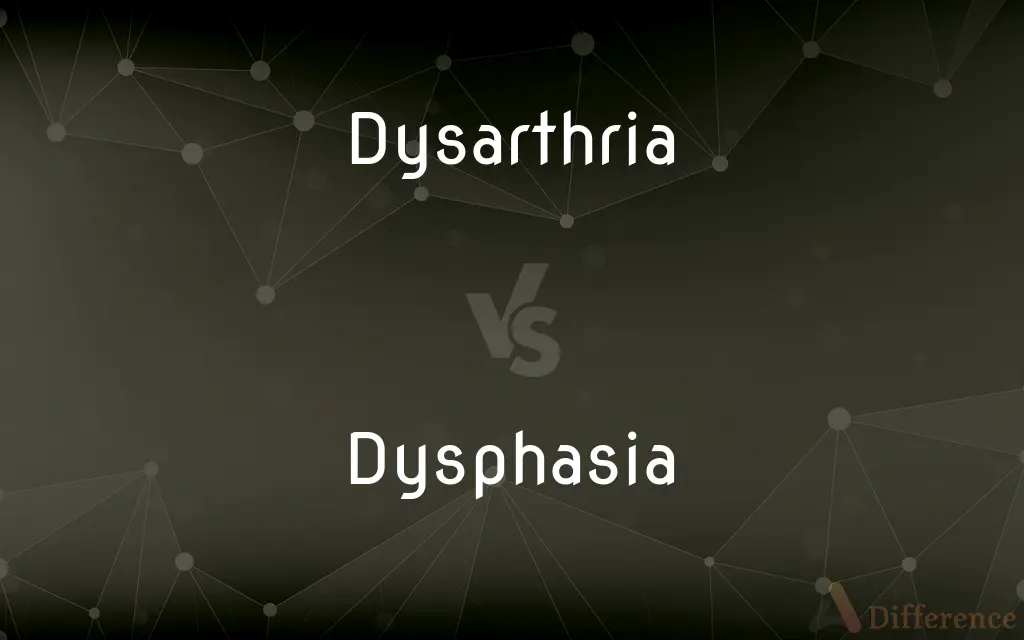Dysarthria vs. Dysphasia — What's the Difference?
By Tayyaba Rehman — Updated on December 23, 2023
Dysarthria is a motor speech disorder affecting the muscles used in speaking. Dysphasia is a language disorder affecting speech comprehension and production.

Difference Between Dysarthria and Dysphasia
Table of Contents
ADVERTISEMENT
Key Differences
Dysarthria results from neurological damage affecting the muscles used in speaking, leading to slurred or slow speech. Dysphasia involves difficulty in language processing, affecting the ability to understand or produce speech.
In dysarthria, the physical ability to speak is impaired, but language comprehension remains intact. With dysphasia, language comprehension or formulation is affected, but the physical ability to speak might remain normal.
Dysarthria can be caused by conditions like stroke, brain injury, or degenerative diseases. Dysphasia, also known as aphasia, often results from damage to language-processing areas of the brain.
Patients with dysarthria may have difficulty articulating words clearly, while those with dysphasia may struggle with finding the right words or understanding speech.
Treatment for dysarthria often includes speech therapy focused on strengthening muscles and improving articulation. Dysphasia treatment typically involves language therapy to improve communication abilities.
ADVERTISEMENT
Comparison Chart
Definition
Motor speech disorder
Language disorder
Primary Impairment
Muscle control in speech
Language comprehension/production
Typical Causes
Neurological damage to motor neurons
Brain damage affecting language areas
Speech Characteristics
Slurred, slow, or difficult speech
Difficulty finding words, understanding speech
Treatment Focus
Strengthening speech muscles, improving articulation
Improving language skills, communication strategies
Compare with Definitions
Dysarthria
A condition causing weakened speech muscles.
His dysarthria made his speech difficult to understand.
Dysphasia
Difficulty in understanding or using spoken language.
Dysphasia made it hard for him to follow conversations.
Dysarthria
Impaired motor control of speech due to neurological issues.
Following the stroke, he developed dysarthria.
Dysphasia
Impairment in the ability to communicate effectively.
Therapy helped her overcome some of the challenges of dysphasia.
Dysarthria
A disorder affecting speech articulation.
Dysarthria affected her ability to pronounce words clearly.
Dysphasia
A condition resulting from brain damage impacting language skills.
He developed dysphasia following a brain injury.
Dysarthria
A speech disorder affecting the clarity and volume of speech.
He underwent therapy to manage his dysarthria.
Dysphasia
A disorder affecting the ability to process language.
After the injury, she experienced dysphasia.
Dysarthria
Difficulty in speaking due to muscle weakness or paralysis.
Dysarthria in her case was caused by a neurological disorder.
Dysphasia
A language impairment affecting expression and comprehension.
Her dysphasia was evident in her struggle to find words.
Dysarthria
Dysarthria is a motor speech disorder resulting from neurological injury of the motor component of the motor–speech system and is characterized by poor articulation of phonemes. In other words, it is a condition in which problems effectively occur with the muscles that help produce speech, often making it very difficult to pronounce words.
Dysphasia
(pathology) Loss of or deficiency in the power to use or understand language as a result of injury or disease of the brain.
Dysarthria
Difficulty in articulating words due to a disturbance in the form or function of the structures that modulate voice into speech; one of the first indicative symptoms of myasthenia gravis, brought about by an autoimmune response to acetylcholine receptors.
Dysphasia
Impairment of speech and verbal comprehension, especially when associated with brain injury.
Dysarthria
Difficulty in articulating words, caused by impairment of the muscles used in speech.
Dysarthria
Impaired articulatory ability resulting from defects in the peripheral motor nerves or in the speech musculature
Common Curiosities
Can dysarthria be temporary?
It can be, especially if caused by conditions like temporary nerve damage.
Are dysarthria and dysphasia related?
They're both speech disorders but affect different aspects of speech.
Can dysarthria affect children?
Yes, dysarthria can occur in children due to congenital or acquired conditions.
Can stroke cause both dysarthria and dysphasia?
Yes, a stroke can potentially cause both conditions.
Is dysphasia always severe?
Dysphasia varies in severity from mild to severe.
Is dysphasia the same as aphasia?
Yes, dysphasia is often used interchangeably with aphasia.
Can children with dysphasia attend regular schools?
Yes, many can with appropriate support and therapy.
Does dysphasia require long-term therapy?
It often does, especially in severe cases.
Are there medications for dysarthria?
There's no specific medication, but treatment often involves speech therapy.
Is dysarthria always noticeable?
Yes, it usually manifests as clear speech difficulties.
Is dysarthria a progressive condition?
It can be, especially in degenerative neurological disorders.
Can dysphasia affect reading and writing?
Yes, it can impact all language-related activities.
Does dysphasia impact intelligence?
No, it doesn't affect intelligence, just language abilities.
Can someone with dysarthria speak clearly again?
With therapy, some individuals can improve their speech clarity significantly.
Can dysarthria be cured?
Treatment can improve it, but a cure depends on the underlying cause.
Share Your Discovery

Previous Comparison
Define vs. Identify
Next Comparison
Provision vs. ProvidenceAuthor Spotlight
Written by
Tayyaba RehmanTayyaba Rehman is a distinguished writer, currently serving as a primary contributor to askdifference.com. As a researcher in semantics and etymology, Tayyaba's passion for the complexity of languages and their distinctions has found a perfect home on the platform. Tayyaba delves into the intricacies of language, distinguishing between commonly confused words and phrases, thereby providing clarity for readers worldwide.













































